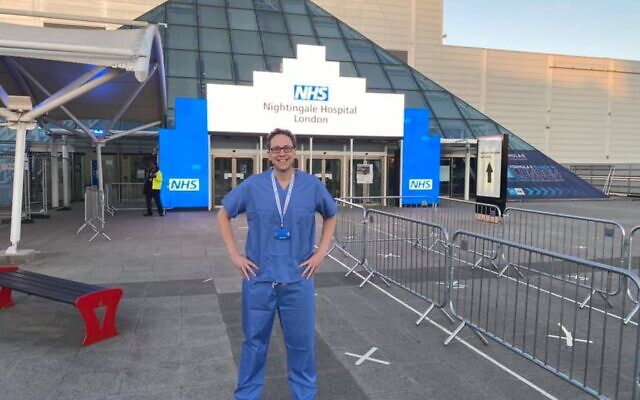Consultant at Nightingale Hospital describes life on the frontline of the virus
Dr Jonathan Behar, who volunteered to help lead the fight against Covid-19, spoke to Jewish News about the challenges he encountered
A Jewish consultant, who volunteered to help lead the fight against coronavirus at Nightingale Hospital, described his experiences on the frontline of the virus.
Dr Jonathan Behar, a consultant cardiologist and electrophysiologist at the Royal Brompton and Harefield Hospitals, spoke to Jewish News last week just as the 4,000-bed medical facility, built at the ExCel centre in east London last month, is set to be placed on standby.
Dr Behar told of “a very tough and gruelling couple of weeks” as he appeared on the first episode of the JN Podcast. “Normally, I’m a cardiologist. I look after heart problems and specifically heart rhythm problems but that service to a large extent has essentially been put on ice because of the pandemic like most other operations,” he explained.
“Therefore I felt that I’d be really most of use in an environment, even though it’s not well known to me, intensive care, I’m used to looking after sick patients and so I thought I’d be some use, so I put my name forward,” he went on.

Communicating with patients while wearing Personal Protective Equipment [PPE], he said, has been one of the biggest challenges. “The main struggle actually is the PPE, not the supply of it. We’ve been perfectly adequately supplied with it. The problem is actually doing a 12 and a half, 13 hour shift, with it on,” he said.
“All lines of communication are completely different when you are in a mask, when you’ve got a hairnet on, a visor, a gown, gloves, and all you have to communicate is your name on the top of the visor and the eyes of the person opposite you who you’re talking to. You have to shout. You have to use hand signals,” he added.
In the weeks leading up to the pandemic hitting the UK, Dr Behar read with some apprehension online testimonies from staff in Italy, he recalled.
“I had a few friends and colleagues in Italy, who as you know are a few weeks ahead of us in terms of the curve of where the pandemic is going, and I was seeing stories on Twitter and social media about how they’d been coping, or not coping, and how they’d been overwhelmed, and doctors had to make really difficult decisions because of a lack of ventilators, and quite frankly that was a terrifying thought that it would happen to us,” he said.
But having been at Nightingale Hospital for several weeks now, he said, the initial apprehension has now turned into an “energy of inspiration and motivation,” and working with medical practitioners with a range of specialities has been “the most amazing thing”.
“I’ve worked on the intensive care unit staffed by intensivists but also staffed people like myself, heart specialists, eye surgeons, shoulder surgeons, psychiatrists, general practitioners, and a whole range of people who are not used working on an intensive care unit, and yet we’ve all come together to do our bit,” he said.
He recalled a heartwarming moment when members of staff on a ward all burst into a spontaneous round of applause after one of their first patients became well enough to be extubated.
Colleagues, he said, “just suddenly stopped and turned around looked at this patient and there was a rapturous applause from applause, and despite all the PPE, you could see in everyone’s eyes how delighted they were that we got a patient through this horrible disease.”
Tune in here: https://audioboom.com/posts/7571567-episode-1

Thank you for helping to make Jewish News the leading source of news and opinion for the UK Jewish community. Today we're asking for your invaluable help to continue putting our community first in everything we do.
For as little as £5 a month you can help sustain the vital work we do in celebrating and standing up for Jewish life in Britain.
Jewish News holds our community together and keeps us connected. Like a synagogue, it’s where people turn to feel part of something bigger. It also proudly shows the rest of Britain the vibrancy and rich culture of modern Jewish life.
You can make a quick and easy one-off or monthly contribution of £5, £10, £20 or any other sum you’re comfortable with.
100% of your donation will help us continue celebrating our community, in all its dynamic diversity...
Engaging
Being a community platform means so much more than producing a newspaper and website. One of our proudest roles is media partnering with our invaluable charities to amplify the outstanding work they do to help us all.
Celebrating
There’s no shortage of oys in the world but Jewish News takes every opportunity to celebrate the joys too, through projects like Night of Heroes, 40 Under 40 and other compelling countdowns that make the community kvell with pride.
Pioneering
In the first collaboration between media outlets from different faiths, Jewish News worked with British Muslim TV and Church Times to produce a list of young activists leading the way on interfaith understanding.
Campaigning
Royal Mail issued a stamp honouring Holocaust hero Sir Nicholas Winton after a Jewish News campaign attracted more than 100,000 backers. Jewish Newsalso produces special editions of the paper highlighting pressing issues including mental health and Holocaust remembrance.
Easy access
In an age when news is readily accessible, Jewish News provides high-quality content free online and offline, removing any financial barriers to connecting people.
Voice of our community to wider society
The Jewish News team regularly appears on TV, radio and on the pages of the national press to comment on stories about the Jewish community. Easy access to the paper on the streets of London also means Jewish News provides an invaluable window into the community for the country at large.
We hope you agree all this is worth preserving.






















